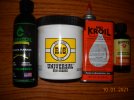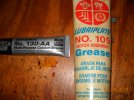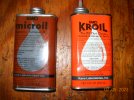Michael
Active Member. Uh/What
Reading through the post on one's "Favorite Press" and what we each like brought back a memory. A number of years ago i.e. 25-ish, I was in the Phoenix/Scottsdale area stopped into Dillon to check out their presses, this was before they were commonly found in a LGS. Another customer was discussing presses with a Dillon employee and asked about what would be their recommendation for lubrication of their presses. The employee responded with what seemed a rather interesting answer, and the reason why, 30W was the answer. The employee asked the gentleman what is one of most demanding environments for lubrication... the internal combustion engine, think about how much engineering has to go into developing something that will be up to that task.
That memory started me thinking about lubrication in general for firearms. Granted there are issues of protecting from rust and corrosion caused by, moisture, salt, sweat, contact with skin, animal blood, etc. Not to mention things like polarity, viscosity, along with other characteristics that are way above my chemistry education. But it started the wheels turning, in terms of basic lubrication and friction, are the scores of "modern high tech" lubes really that much better than 30W under normal conditions that we frequently shoot in. I know that some lubricants thicken up has the temperature drops.
Now.... I am very confident that some of you have a far greater grasp and chemical working knowledge of this topic than many of us, especially myself, which is perfectly fine. Thinking the replies and explainations should be very educational and enlightening.
That memory started me thinking about lubrication in general for firearms. Granted there are issues of protecting from rust and corrosion caused by, moisture, salt, sweat, contact with skin, animal blood, etc. Not to mention things like polarity, viscosity, along with other characteristics that are way above my chemistry education. But it started the wheels turning, in terms of basic lubrication and friction, are the scores of "modern high tech" lubes really that much better than 30W under normal conditions that we frequently shoot in. I know that some lubricants thicken up has the temperature drops.
Now.... I am very confident that some of you have a far greater grasp and chemical working knowledge of this topic than many of us, especially myself, which is perfectly fine. Thinking the replies and explainations should be very educational and enlightening.
Last edited:



